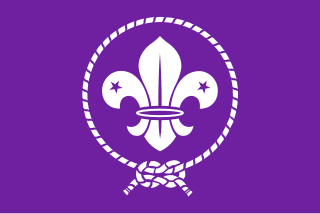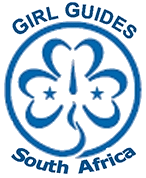AIESEC is an international "youth-run" and led, non-governmental and not-for-profit organization that provides young people with business development internships. The organization focuses on empowering young people to make a progressive social impact. The AIESEC network includes approximately 40,000 members in 120+ countries.

Girl Scouts of the United States of America (GSUSA), commonly referred to as simply Girl Scouts, is a youth organization for girls in the United States and American girls living abroad. It was founded by Juliette Gordon Low in 1912, a year after she had met Robert Baden-Powell, the founder of Scouting.

The World Association of Girl Guides and Girl Scouts is a global association supporting the female-oriented and female-only Guiding and Scouting organisations in 152 countries. It was established in 1928 in Parád, Hungary, and has its headquarters in London, United Kingdom. It is the counterpart of the World Organization of the Scout Movement (WOSM). WAGGGS is organised into five regions and operates five international Guiding centers. It holds full member status in the European Youth Forum (YFJ), which operates within the Council of Europe and European Union areas, and works closely with these bodies.

The European Scout Region is one of six geographical subdivisions of the World Organization of the Scout Movement, headquartered in Geneva, Switzerland, with a satellite office in Brussels, Belgium.

The Africa Scout Region is the divisional office of the World Scout Bureau of the World Organization of the Scout Movement, headquartered in Nairobi, Kenya, with satellite offices in Cape Town, South Africa, and Dakar, Senegal. The Africa Region services Scouting in Sub-Saharan Africa and neighboring islands that are recognized members of the World Organization of the Scout Movement (WOSM). Currently, the region has 39 member National Scout Associations/Organizations and 11 potential members. There are about one million registered Scouts in Africa, though it is suspected that there are about twice that number in the region. The large nations of Mali, Guinea-Bissau and the Central African Republic, and several smaller nations, are not yet WOSM members, for various reasons.

The International Scout and Guide Fellowship (ISGF) is a worldwide organization of adults in support of Scouting and Guiding.
Sangam World Centre is one of the five World Centres of the World Association of Girl Guides and Girl Scouts (WAGGGS), located on the banks of the Mula River in Pune.

The European University Institute (EUI) is an international postgraduate and post-doctoral research-intensive university and an intergovernmental organisation with juridical personality, established by its founding member states to contribute to cultural and scientific development in the social sciences, in a European perspective. Its main campus is located in the hills above Florence in Fiesole, Italy.

The Girl Guides South Africa is a girls-only organisation and is recognised by the World Association of Girl Guides and Girl Scouts (WAGGGS). As of 2003 it has 20,466 members.

Our Chalet is an international Girl Guide/Girl Scout centre and one of five World Centres of the World Association of Girl Guides and Girl Scouts (WAGGGS). The others are Our Cabaña, Sangam, Kusafiri and Pax Lodge. Our Chalet is just outside Adelboden, in the Bernese Oberland of Switzerland. Located in the Bernese Alps, it is 1,350 metres (4,430 ft) above sea level.

Pax Lodge is the World Association of Girl Guides and Girl Scouts (WAGGGS) World Centres in Hampstead, London, England. It was opened on 15 March 1991, preceded by Olave House (1959–1988), named after Olave Baden-Powell which was preceded by Our Ark (1939–1959).

Nuestra Cabaña, is an international Girl Guide centre of the World Association of Girl Guides and Girl Scouts (WAGGGS) located in Cuernavaca, Mexico, It opened in July 1957 as a Baden-Powell centennial memorial. The centre can house over 100 guests.
The World Conference is the governing body of the World Association of Girl Guides and Girl Scouts and meets every three years. If a country has more than one association, the associations form a federation for coordination and world representation.

Girl Guides is a worldwide movement, originally and largely still designed for girls and women only. The movement began in 1909, when girls requested to join the then-grassroots Boy Scout Movement.

The International Growth Centre (IGC) is an economic research centre based at the London School of Economics, operated in partnership with University of Oxford's Blavatnik School of Government.

The Rwanda women's national football team represents Rwanda in women's association football and is controlled by the Rwandese Association Football Federation. It had to date been scheduled to compete in one major tournament, the inaugural Women's Challenge Cup held in Zanzibar in October 2007, but the event was ultimately canceled. It has finally debuted in February 2014 against Kenya. The team is nicknamed The She-Amavubi.

The Young African Leaders Initiative (YALI) is an initiative of the United States Department of State. It was begun in 2010 by President Barack Obama. YALI is a programme aimed at educating and networking young African leaders with activities including the Mandela Washington Fellowship that brings them to study in the United States for six weeks, with follow-up resources, and student exchange programs. In 2014, the program was expanded to include four regional "leadership centers" in Ghana, Kenya, Senegal and South Africa.
Arab Scout Jamborees are region-wide events run or sponsored by member countries of the Arab Scout Region of the World Organization of the Scout Movement. During the 1953 14th World Scout Conference in Liechtenstein, Syria offered to host the 8th World Scout Jamboree, but was denied after Israel protested that Israeli Scouts couldn't enter Arab countries. The Arab delegations felt that they wouldn't be able to host such international events and decided to organize on the Pan-Arab level. They prepared a draft in March 1954 that was approved by the Arab League Council on its 21st session, establishing the Arab Scout Organization. The first Arab Scout Conference was held at Zabadani, Syria in the summer of 1954, where the Arab Scout Committee was formed.

The 9th Summit of the Non-Aligned Movement on 4–7 September 1989 in Belgrade, SR Serbia, SFR Yugoslavia was the conference of Heads of State or Government of the Non-Aligned Movement. Belgrade was the first city to host the Summit for the second time after it hosted the 1st Summit of the Non-Aligned Movement in 1961. Yugoslavia was unanimously selected as the host of the Summit at the 1988 Non-Aligned Foreign Ministers Conference in Nicosia, Cyprus. While the Federal Secretary of Foreign Affairs of Yugoslavia led by Budimir Lončar was excited, the Presidency of Yugoslavia, Yugoslav collective head of state, was skeptical about the prospects of hosting the event but ultimately supported it by Josip Vrhovec in fear that rejection may show the level of the crisis in the country. The comparatively weak federal government organizers of the event ultimately hoped that the conference may convince leaders of the strong Yugoslav federal republics to resolve the early Yugoslav crisis in a constructive and peaceful way, yet it nevertheless escalated in 1991 Yugoslav Wars. The event is therefore sometimes described as the swan song of the prominent Yugoslav Cold War diplomacy. Summit took place at the Sava Centar in New Belgrade. Janez Drnovšek held the opening remarks in Slovenian language.
The domain of international space politics gained significant traction during the Cold War. This was largely fuelled by the ongoing space race between the USA and the USSR. At this time in history, space exploration was an endeavour largely restricted to the global superpowers and seemed out of reach for many smaller, developing, nations to actively participate in. Subsequently, public concerns for the cost of research and development into novel space technologies did not receive sufficient policy and academic attention in Africa. As the Cold War reached its conclusion, political power began to diffuse across the world, and this led to many smaller nation states developing national and regional space capabilities. In the context of Africa, Nigeria, Algeria, Egypt and South Africa were the front-runners in terms of investments into space-related research and development.














